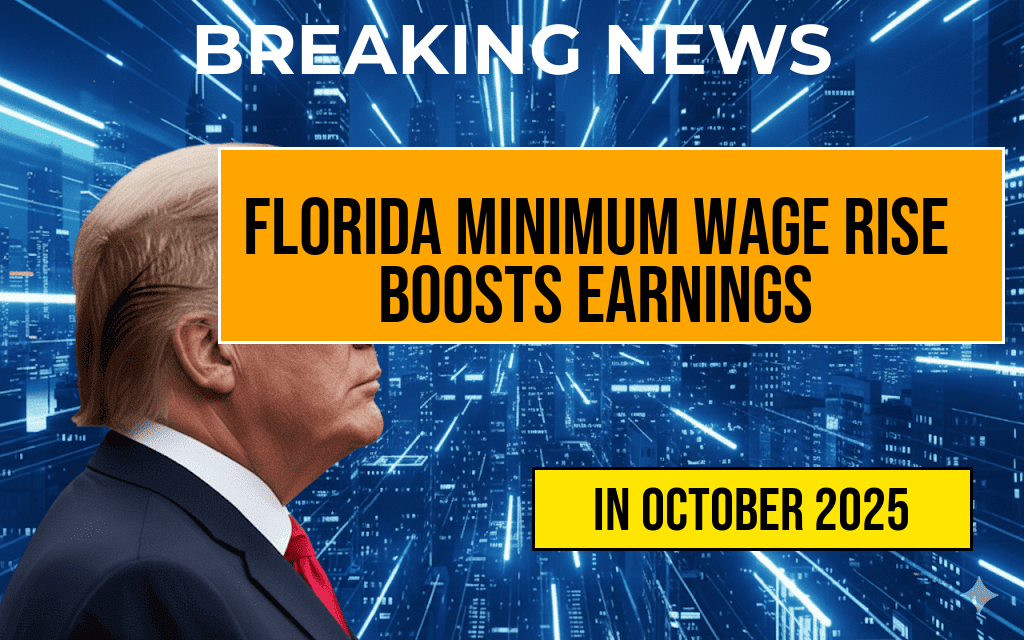Florida’s Minimum Wage Rise to $14 an Hour Expected to Significantly Boost Full-Time Workers’ Earnings
Florida’s recent decision to raise the minimum wage to $14 per hour takes effect at the start of next year, marking a notable increase from the current $11.25. This adjustment aims to improve the financial stability of thousands of low-wage workers across the state. For full-time employees working 40 hours weekly, this change could translate into an annual earnings boost of approximately $2,080. Advocates argue that the increase will help address the rising cost of living, while some business groups express concerns about potential impacts on employment levels. As Florida joins a growing number of states implementing gradual wage hikes, the move underscores ongoing debates over living wages, economic growth, and labor market health in the Sunshine State.
Details of the Wage Increase and Its Impact on Earnings
The Florida minimum wage, set to rise from $11.25 to $14 effective January 1, 2024, reflects a planned increase aligned with inflation adjustments. The increase amounts to a 24.4% jump, significantly outpacing previous incremental hikes. For workers employed full-time at 40 hours weekly, this translates into an additional $8 per hour, amounting to an annual increase of roughly $2,080 before taxes.
| Hourly Wage Increase | Additional Weekly Earnings | Annual Earnings Boost (52 weeks) |
|---|---|---|
| $2.75 (from $11.25 to $14) | $110 | $5,720 |
However, the actual increase in annual earnings depends on the number of hours worked. For a standard 40-hour workweek, the total additional income is approximately $2,080 annually, providing a meaningful lift for workers struggling with rising expenses.
Broader Economic Implications
Cost of Living and Consumer Spending
Proponents of the wage hike argue that increasing the minimum wage can reduce poverty levels and stimulate local economies through higher consumer spending. With more disposable income, workers are likely to spend more on housing, food, and transportation, which could have a ripple effect benefiting small businesses and service industries across Florida.
Business Response and Potential Challenges
Some business groups express reservations, warning that higher wages could lead to increased operational costs. Small businesses, in particular, fear that the wage hike might force layoffs, cutbacks, or higher prices for consumers. However, economic studies, such as those referenced by the Wikipedia entry on minimum wage, show mixed results regarding employment impact, with many recent analyses indicating minimal effect on overall employment levels.
State and Local Context of Wage Policies
Florida’s move aligns with a broader trend among states and cities adopting higher minimum wages ahead of federal adjustments. The state’s previous minimum wage was already above the federal level of $7.25, but the increase signifies a renewed commitment to improving living standards. Several cities within Florida, including Miami and Tampa, have enacted their own minimum wage ordinances, further complicating the wage landscape.
Looking Ahead: Economic and Social Outcomes
Experts anticipate that the wage increase will provide immediate financial relief for many workers, especially those in service, retail, and hospitality sectors. Over time, policymakers and economists will monitor whether the boost translates into reduced reliance on public assistance programs or improved job satisfaction. Additionally, discussions about raising wages continue to be a key aspect of Florida’s political discourse, reflecting ongoing debates about balancing economic growth with fair labor standards.
For more information on Florida’s wage policies and economic outlook, visit Florida Today and the Florida Department of Economic Opportunity.
Frequently Asked Questions
What is the new minimum wage in Florida?
The minimum wage in Florida will increase to $14 per hour, providing higher earnings for full-time workers.
How much could full-time workers’ annual earnings increase with the wage hike?
Full-time workers could see an increase of approximately $2,080 in their annual earnings due to the wage increase.
When will the minimum wage increase take effect?
The wage increase is scheduled to take effect on January 1, 2024.
Who will be affected by the Florida minimum wage increase?
The full-time workers earning close to or below the new minimum wage will benefit the most from the higher hourly rate.
Are there any future plans for additional minimum wage increases in Florida?
Yes, Florida has plans for ongoing incremental wage increases based on inflation and economic factors, aiming to gradually raise the minimum wage over the coming years.

Leave a Reply